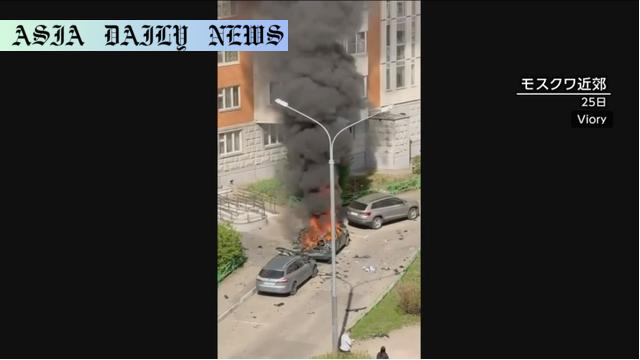Explosion: Lieutenant General Yaroslav Moskalik, deputy chief of Russia’s armed forces, killed in a car explosion near his home.
Explosion near Moscow killed Lieutenant General Yaroslav Moskalik.
Russian investigators suspect an improvised explosive device caused the blast.
Latest in series of attacks since start of the Ukraine invasion.
Explosion occurred near the officer’s home while he walked by.

Senior Russian Military Officer Killed in Shocking Explosion
In a tragic turn of events, Lieutenant General Yaroslav Moskalik, a high-ranking officer in the Russian military and deputy chief of the Main Operational Directorate of the General Staff, was killed in a devastating car explosion near Moscow. The incident, which took place while the officer was walking past a parked vehicle near his residence, has sent shockwaves through the Russian defense community and the country as a whole.
According to Russia’s Investigative Committee, preliminary investigations suggest that an improvised explosive device (IED) was used to orchestrate the attack. Such devices are often associated with covert operations and acts of sabotage, raising suspicions about possible motives and those who could be behind the attack. Given the sensitive nature of Lieutenant General Moskalik’s work, there is growing speculation that the attack may have a broader connection to Russia’s ongoing geopolitical struggles.
A Pattern of Explosions Amid Conflict
This attack is the most recent in a string of explosions and similar incidents within Russia, following its invasion of Ukraine over three years ago. These incidents have primarily targeted individuals associated with the country’s military and defense sectors, reducing not only operational capacity but also morale. Just last December, two other Russian military officials lost their lives in an eerily similar explosion in Moscow. Together, these events paint a troubling picture of domestic vulnerabilities in Russia’s internal security apparatus.
The Investigation: What Lies Ahead
Following this tragic explosion, a criminal investigation has been launched to determine the source and perpetrators of the attack. Russian authorities aim to establish whether this was a politically motivated act linked to the Ukraine conflict or if other domestic groups had a hand in the sabotage. The use of an IED, a tactic often associated with guerilla warfare, certainly raises questions about the capabilities and reach of such hostile entities operating within Russian borders.
Investigators are likely to comb through a wide range of evidence, including security footage from the area, to identify suspects and strengthen the case. However, given the growing frequency of such incidents, this attack raises pressing questions about the overall strength of Russian intelligence in preempting threats like these. The implications of failing to curb these attacks could be far-reaching, affecting both domestic stability and international perception of the Kremlin’s power dynamics.
Implications for Russia’s Geopolitics
As this story develops, observers around the world are keeping a close eye on how the Kremlin will respond. With Russia deeply entrenched in an ongoing conflict in Ukraine, this deadly attack has placed further strain on its already stretched security forces. The nature of this incident—occurring close to the capital—raises alarming concerns about vulnerability at the heart of Russian power. Moreover, it underscores the continuing domestic fallout of a prolonged campaign abroad.
From an international perspective, this attack highlights the broader risks associated with Russia’s foreign interventions and internal security challenges. These recent explosions, while tragic, hint at possible fractures within the country’s political and military framework. This could lead to new complications in how Russia projects power both at home and abroad.
Commentary
The Unsettling Vulnerability of Russian Security
When high-ranking officials of a country’s military fall victim to targeted attacks, it raises profound concerns about the nation’s internal security apparatus. The tragic loss of Lieutenant General Yaroslav Moskalik is not only a human tragedy but also a glaring indicator of vulnerabilities in Russia’s security infrastructure. This incident, coupled with the ongoing geopolitical context surrounding the Ukraine invasion, paints a troubling picture of systemic weaknesses.
What This Means for Geopolitics
The world is closely watching Russia, not just for its actions on the battlefield in Ukraine but also for signs of internal stability. This explosion, tragically claimed near the Russian capital, has sent a symbolic message that even Moscow is not immune to such incidents. If attacks continue to escalate, the country’s ability to maintain order and effectively govern could be questioned. Domestically, this also puts immense pressure on Russian leadership to ensure confidence among its citizens and military personnel.
The Broader Implications of Continued Attacks
Tragic events such as this underscore how intertwined security policies and foreign affairs have become for Russia. As domestic security breaches grow in frequency, they symbolize the costs of prolonged external conflicts and their blowback. Russia faces an urgent need to reassess its defensive measures while also addressing the deeper systemic risks that such incidents reveal. Without addressing these vulnerabilities, the nation risks further erosion of its internal cohesion.
In conclusion, Lieutenant General Moskalik’s death is more than a tragedy—it’s a wake-up call for a nation facing challenges on multiple fronts. Whether this tragedy leads to systemic improvements or remains an ominous sign of things to come is yet to be seen.


